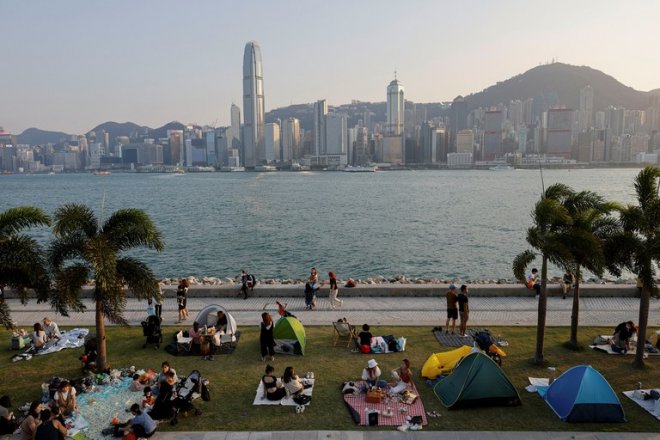Hong Kong plans to loosen laws to allow more reclamation of Victoria Harbour*
Authorities in Hong Kong are planning to weaken environmental protections for the city’s iconic Victoria Harbour, removing the need for judicial oversight of major reclamation projects that could chip away at the city’s marine heritage.
The city’s Development Bureau on Sunday said it wants to revise the Protection of the Harbour Ordinance to make it easier to push through harbourfront projects, with Harbourfront Commissioner Leonie Lee writing on her blog that some projects have been stalled because they have failed to show that there is an “overriding public need” for them, as required under the current law.
The move comes amid far-reaching political changes under a draconian security law granting far greater powers to the executive, electoral changes that turned the Legislative Council into a rubber stamp for the government, and a citywide crackdown on pro-democracy media.
Officials claim the changes will make it easier to build public works like promenades, boardwalks, cycle tracks, swimming pools, viewing decks and piers.
But campaigners say projects like that are already permitted under the law if there is a public need for them, and the move will deny the public a say in major reclamation projects.
Taking the courts out of the process
Winston Chu, who heads the Society for the Protection of the Harbour, told
The Standard newspaper that the real effect of the change will be felt when the amendment takes away the right of the courts to approve bigger development projects, leaving such decisions in the hands of the administration alone, with no need to consult the general public.
Chu said the Society had previously used the law to prevent 600 hectares, or 140 million square feet, of land from being reclaimed from Victoria Harbour.
“If this section passes the government can proceed with all these large-scale reclamations without the public having any right to stop it,” he told the paper, adding that the Society would likely disband if the legislation went through, as it would no longer have any channel through which to advocate.
“If that happens, then eventually, Victoria Harbour will disappear,” he warned in comments reported by Radio Television Hong Kong.
Development officials want to remove the “public need” requirement from any project covering less than 0.8 hectares, and from non-permanent projects, with larger projects assessed by the chief executive and his cabinet, the Executive Council.
![]()
People picnic near the Victoria Harbour during sunset in Hong Kong, Oct. 28, 2022. Credit: Reuters
Brian Wong of the non-government group Liber Research Community, which has carried out extensive impact assessments linked to a massive and controversial reclamation project planned for Hong Kong’s Lantau Island, said the entire point of the harbor protection law was to establish the waterway as a public good, and not the property of any one person or entity.
“Past lawsuits and judgments under the Protection of the Harbour Ordinance have concluded that Hong Kong assets are a public good,” Wong said. “This is the result of 20-something years of campaigning by civil groups.”
“In future, planning decisions won’t need to be based on this principle because the government will no longer need to ask its citizens about them, and there will be no legal limits,” he said. “It will basically be down to [officials] to decide.”
Wong said the amendments will further concentrate power in the hands of the administration, with fewer checks and balances.
“Residents will lose their say over public assets and urban spaces,” he said.
Artificial island projects faced problems elsewhere
In a recent report on large-scale reclamation projects co-authored with Greenpeace, Liber Research Community said many large-scale reclamation projects around the world have “fallen short of expectations,” citing data it said should give the Hong Kong government pause when it comes to the Lantau Tomorrow Vision artificial island project, due to start in 2025.
“New land reclamation technologies have been touted by the government as ‘eco-friendly,’ yet case studies show that many large-scale artificial island projects have caused serious environmental, social and governance problems which cannot be overcome by technologies alone,” the report said.
Artificial island projects around the world have been plagued by financial problems, delays in construction and excess vacancy rates, despite the involvement of global consultancies, the report found.
It said at least 10 major reclamation projects have met with local opposition, with four stalled or trimmed due to public pressure.
“The reasons for the local opposition against land reclamation were mostly about the neglect of public opinion and needs, as well as the environmental and social impacts since project commencement,” it said.
Translated by Luisetta Mudie. Edited by Matt Reed.
 | 喜歡這篇嗎?快分享吧! |
前一頁
後一頁
 People picnic near the Victoria Harbour during sunset in Hong Kong, Oct. 28, 2022. Credit: Reuters
People picnic near the Victoria Harbour during sunset in Hong Kong, Oct. 28, 2022. Credit: Reuters